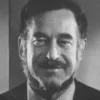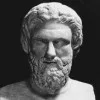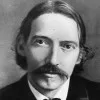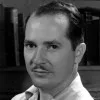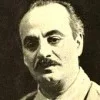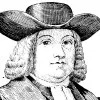All children, except one, grow up. They soon know that they will grow up, and the way Wendy knew was this. One day when she was two years old she was playing in a garden, and she plucked another flower and ran with it to her mother. I suppose she must have looked rather delightful, for Mrs. Darling put her hand to her heart and cried, “Oh, why can’t you remain like this for ever!” This was all that passed between them on the subject, but henceforth Wendy knew that she must grow up. You always know after you are two. Two is the beginning of the end.
J. M. Barrie (1860-1937) Scottish novelist and dramatist [James Matthew Barrie]
Peter and Wendy, ch. 1 “Peter Breaks Through” (1911)
(Source)
Opening words, not included in the play.
Quotations about:
parent
Note not all quotations have been tagged, so Search may find additional quotes on this topic.
He is her glory. Any woman could say it. For every one of them, God is in her child. Mothers of great men must have been familiar with this feeling, but then, all women are mothers of great men — it isn’t their fault if life disappoints them later.
Boris Pasternak (1890-1960) Russian poet, novelist, and literary translator
Doctor Zhivago [До́ктор Жива́го], Part 2, ch. 9 “Varykino,” sec. 3 [Yury] (1955) [tr. Hayward & Harari (1958), US ed.]
(Source)
Comparing all motherhood to that of Mary toward Jesus.
Alternate translations:He is her glory. Any woman could say it. For every one of them, God is in her child. Mothers of great men must have this feeling particularly, but then, at the beginning, all women are mothers of great men -- it isn’t their fault if life disappoints them later.
[tr. Hayward & Harari (1958), UK ed.]He is her glory. Every woman can say the same. Her god is in her child. Mothers of great people should be familiar with that feeling. But decidedly all mothers are mothers of great people, and it is not their fault that life later disappoints them.
[tr. Pevear & Volokhonsky (2010)]
And in that moment Sherman made the terrible discovery that men make about their fathers sooner or later. For the first time he realized that the man before him was not an aging father but a boy, a boy much like himself, a boy who grew up and had a child of his own and, as best he could, out of a sense of duty and, perhaps love, adopted a role called Being a Father so that his child would have something mythical and infinitely important: a Protector, who would keep a lid on all the chaotic and catastrophic possibilities of life.
Tom Wolfe (1930-2018) American author and journalist [Thomas Kennerly Wolfe Jr.]
The Bonfire of the Vanities, ch. 21 (1987)
(Source)
No one is more susceptible to an experts fearmongering than a parent. Fear is in fact a major component of the act of parenting. A parent, after all, is the steward of another creature’s life, a creature who in the beginning is more helpless than the newborn of nearly any other species. This leads a lot of parents to spend a lot of their parenting energy simply being scared.
Steven Levitt (b. 1967) American economist and author
Freakonomics, ch. 5 “What Makes A Perfect Parent?” (2005) [with Stephen Dubner]
(Source)
Do not, on a rainy day, ask your child what he feels like doing, because I assure you that what he feels like doing, you won’t feel like watching.
Your responsibility as a parent is not as great as you might imagine. You need not supply the world with the next conqueror of disease or major motion-picture star. If your child simply grows up to be someone who does not use the word “collectible” as a noun, you can consider yourself an unqualified success.
A bitter-tongued parent cannot teach respect for facts. Truth for its own sake can be a deadly weapon in family relations. Truth without compassion can destroy love. Some parents try too hard to prove exactly how, where and why they have been right. This approach will bring bitterness and disappointment. When attitudes are hostile, facts are unconvincing.
Haim Ginott (1922-1973) Israeli-American school teacher, child psychologist, psychotherapist [b. Haim Ginzburg]
Between Parent and Teenager, ch. 2 “Rebellion and Response” (1969)
(Source)
Sometimes mis-cited to the earlier Between Parent and Child (1965).
The root of human virtue seldom bears
Like branches; and the Giver wills it so,
That men may know it is His gift, not theirs.
[Rade volte risurge per li rami
l’umana probitate; e questo vole
quei che la dà, perché da lui si chiami.]Dante Alighieri (1265-1321) Italian poet
The Divine Comedy [Divina Commedia], Book 2 “Purgatorio,” Canto 7, l. 121ff (7.121-123) (1314) [tr. Sayers (1955)]
(Source)
Dante noting that the sons of great kings rarely measure up to their fathers, a reminder from God that those who would be great must seek His blessing, not rely on their heritage.
(Source (Italian)). Alternate translations:Rarely into the branches of the tree
Doth human worth mount up; and so ordains
He who bestows it, that as his free gift
It may be call’d.
[tr. Cary (1814)]Rarely shoots merit up into the boughs,
Or human worth; and such the will of Him,
That from the Donor they should seem to come.
[tr. Bannerman (1850)]Not oftentimes upriseth through the branches
The probity of man; and this He wills
Who gives it, so that we may ask of Him.
[tr. Longfellow (1867)]Seldom rises human goodness through the branches; and this wills He who gives it in order that from Him it may be claimed.
[tr. Butler (1885)]But rarely in the branch again is grown
Our human excellence, so willeth He
Who gives it, that the boon be called His own.
[tr. Minchin (1885)]Rarely doth human goodness rise through the branches, and this He wills who gives it, in order that it may be asked from Him.
[tr. Norton (1892)]Rarely doth human probity rise through the sons branches:
and this he wills who giveth it,
so that it may be prayed for from him.
[tr. Okey (1901)]Rarely does human worth rise through the branches, and this He wills who gives it, that it may be sought from Him.
[tr. Sinclair (1939)]Full seldom human virtue rises through
The branches; and the Giver wills it so,
That they to him for such a gift may sue.
[tr. Binyon (1943)]Rare is the tree that lifts to every limb
the sap of merit -- He who gives, so wills
that men may learn to beg their best from Him.
[tr. Ciardi (1961)]Rarely does human worth rise through the branches, and this He wills who gives it, in order that it may be asked from Him.
[tr. Singleton (1973)]Not often does the sap of virtue rise
to all the branches. This is His own gift,
and we can only beg that He bestow it.
[tr. Musa (1981)]Rarely does human worth rise through the branches;
That is the will of him whose gift it is,
So that it should be matter for petition.
[tr. Sisson (1981)]How seldom human worth ascends from branch to branch,
and this is willed by Him who grants that gift,
that one may pray to Him for it!
[tr. Mandelbaum (1982)]Seldom does human probity rise up through the branches, and this is willed by him who gives it, that it may be attributed to him.
[tr. Durling (2003)]Human worth rarely increases through its branches: and this He wills who creates it, so that it may be asked for of him.
[tr. Kline (2002)]It seldom happens that man’s probity
will rise through every branch. He wills it thus,
so, given from beyond, it’s known as His.
[tr. Kirkpatrick (2007)]Rarely does human worth rise through the branches.
And this He wills who gives it,
so that it shall be sought from Him.
[tr. Hollander/Hollander (2007)]Goodness rarely flows to the spreading branches
Of a family tree, for God who gives it decrees
That since the gift is His, humans must ask it.
[tr. Raffel (2010)]
Parents are often so busy with the physical rearing of children that they miss the glory of parenthood, just as the grandeur of trees is lost when raking leaves.
Marcelene Cox (1900-1998) American writer, columnist, aphorist
“Ask Any Woman” column, Ladies’ Home Journal (1945-05)
(Source)
LEAR: Ingratitude, thou marble-hearted fiend,
More hideous, when thou show’st thee in a child
Than the sea-monster!William Shakespeare (1564-1616) English dramatist and poet
King Lear, Act 1, sc. 4, l. 270ff (1.4.270-272) (1606)
(Source)
The reason some parents really enjoy their children is that they take the time to live with them.
Marcelene Cox (1900-1998) American writer, columnist, aphorist
“Ask Any Woman” column, Ladies’ Home Journal (1946-04)
(Source)
VOLUMNIA: Hear me profess sincerely: had I a dozen sons, each in my love alike and none less dear than thine and my good Martius, I had rather had eleven die nobly for their country than one voluptuously surfeit out of action.
William Shakespeare (1564-1616) English dramatist and poet
Coriolanus, Act 1, sc. 3, l. 21ff. (1.3.21) (c. 1608)
(Source)
"Voluptuously surfeit out of action" = to die indulgent, idle, and lazy
LEAR: How sharper than a serpent’s tooth it is
To have a thankless child.William Shakespeare (1564-1616) English dramatist and poet
King Lear, Act 1, sc. 4, l. 302ff (1.4.302-303) (1606)
(Source)
Probably no parent is truly born in the moment of birth; the miracle more likely happens in the moment the baby first curls its tiny hand around the parent’s large finger.
Marcelene Cox (1900-1998) American writer, columnist, aphorist
“Ask Any Woman” column, Ladies’ Home Journal (1963-01/02)
(Source)
But the best inheritance that fathers can give their children, more precious than any patrimony however large, is a reputation for virtue and for worthy deeds, which if the child disgraces, his conduct should be branded as infamous and impious.
[Optima autem hereditas a patribus traditur liberis omnique patrimonio praestantior gloria virtutis rerumque gestarum, cui dedecori esse nefas et vitium iudicandum est.]
Marcus Tullius Cicero (106-43 BC) Roman orator, statesman, philosopher
De Officiis [On Duties; On Moral Duty; The Offices], Book 1, ch. 33 (1.33) / sec. 121 (44 BC) [tr. Peabody (1883)]
(Source)
(Source (Latin)). Alternate translation:Now the noblest inheritance that can ever be left by a father to his son, and far exceeding that of houses and lands, is the fame of his virtues and glorious actions; and for a son to live so, as is unworthy of the name and reputation of his ancestors, is the basest and most abominable thing in the world.
[tr. Cockman (1699)]The best inheritance left by a father to his children, superior to every other patrimony, is the honor of a virtuous conduct, and the glory of his public transactions. And it is base and criminal by an unworthy conduct, to bring disgrace upon a father's reputation.
[tr. McCartney (1798)]Now, the best inheritance a parent can leave a child -- more excellent than any patrimony -- is the glory of his virtue and his deeds; to bring disgrace on which ought to be regarded as wicked and monstrous.
[tr. Edmonds (1865)]The noblest heritage, the richest patrimony a father can bequeath to his children is a reputation for virtue and noble deeds. To tarnish his good name is a sin and a crime.
[tr. Gardiner (1899)]The best legacy a father can leave to his children, a legacy worth far more than the largest patrimony, is the fame of a virtuous and well-spent life. He who disgraces such a bequest is deserving of infamy.
[ed. Harbottle (1906)]The noblest heritage, however, that is handed down from fathers to children, and one more precious than any inherited wealth, is a reputation for virtue and worthy deeds; and to dishonour this must be branded as a sin and a shame.
[tr. Miller (1913)]The best heritage that descends from fathers to sons is the fame for honesty and great deeds. Such fame surpasses any legacy. We must judge it a crime and a shame to disgrace it.
[tr. Edinger (1974)]
A sick man that gets talking about himself, a woman that gets talking about her baby, and an author that begins reading out of his own book, never know when to stop.
O prince, in early youth divinely wise,
Born, the Ulysses of thy age to rise
If to the son the father’s worth descends,
O’er the wide wave success thy ways attends
To tread the walks of death he stood prepared;
And what he greatly thought, he nobly dared.[Τηλέμαχ᾽, οὐδ᾽ ὄπιθεν κακὸς ἔσσεαι οὐδ᾽ ἀνοήμων,
εἰ δή τοι σοῦ πατρὸς ἐνέστακται μένος ἠύ,
οἷος κεῖνος ἔην τελέσαι ἔργον τε ἔπος τε:
οὔ τοι ἔπειθ᾽ ἁλίη ὁδὸς ἔσσεται οὐδ᾽ ἀτέλεστος.]Homer (fl. 7th-8th C. BC) Greek author
The Odyssey [Ὀδύσσεια], Book 2, l. 271ff (2.271) (c. 700 BC) [tr. Pope (1725)]
(Source)
(Source (Greek)). Alternate translations:Those Wooers well might know, Telemachus,
Thou wilt not ever weak and childish be,
If to thee be instill’d the faculty
Of mind and body that thy father grac’d;
And if, like him, there be in thee enchac’d
Virtue to give words works, and works their end.
This voyage, that to them thou didst commend,
Shall not so quickly, as they idly ween,
Be vain, or giv’n up, for their opposite spleen.
[tr. Chapman (1616)]If in you you retain the spirit brave
Your father had, to make his word his deed,
Then also the assurance I shall have,
To tell you in your voyage you shall speed.
[tr. Hobbes (1675), l. 257ff]Telemachus! thou shalt hereafter prove
Nor base, nor poor in talents. If, in truth,
Thou have received from heav’n thy father’s force
Instill’d into thee, and resemblest him
In promptness both of action and of speech,
Thy voyage shall not useless be, or vain.
[tr. Cowper (1792), l. 355ff]Not base and foolish after all is done
Shalt thou be counted, if the brave old blood
hath from the sire descended to the son.
If thou like him both word and deed make good,
Then were thy journey all in vain withstood.
[tr. Worsley (1861), st. 37]Tel'mac'! no craven wilt thou be nor dullard;
If but one drop of they sire's good blood be in thee,
Such as he was in feats of deed or word:
So will not be thy journey vain nor bootless!
[tr. Bigge-Wither (1869)]Telemachus, even hereafter thou shalt not be craven or witless, if indeed thou hast a drop of thy father’s blood and a portion of his spirit; such an one was he to fulfil both word and work. Nor, if this be so, shall thy voyage be vain or unfulfilled.
[tr. Butcher/Lang (1879)]Telemachus, now shalt thou be no foolish faintheart thing.
If of they father's good-heart in thee hath sprung the seed,
Such a man for the word well-spoken, and fulfilment of the deed,
Not in vain shall be thy faring, nor thy going forth be undone.
[tr. Morris (1887)]Telemachus, henceforth you shall not be a base man nor a foolish, if in you stirs the brave soul of your father, and you like him can give effect to deed and word. Then shall this voyage not be vain and ineffective.
[tr. Palmer (1891)]Telemachus, if you are made of the same stuff as your father you will be neither fool nor coward henceforward, for Ulysses never broke his word nor left his work half done. If, then, you take after him, your voyage will not be fruitless.
[tr. Butler (1898)]Telemachus, neither hereafter shalt thou be a base man or a witless, if aught of thy father's goodly spirit has been instilled into thee, such a man was he to fulfil both deed and word. So then shall this journey of thine be neither vain nor unfulfilled.
[tr. Murray (1919)]Telemachus, let not your courage and resource fail you now. In your father deed and word notably marched together to their deliberate end. If your body holds a trace of his temper it will suffice to make this effort of yours neither bootless nor aimless.
[tr. Lawrence (1932)]Today has proved you, Telemachus, neither a coward nor a fool, nor destined to be such, if we are right in thinking that your father’s manly vigour has descended to his son -- and what a man he was in action and debate! No fear, then, that this journey of yours will end in farce or failure.
[tr. Rieu (1946)]You'll never be fainthearted or a fool,
Telémakhos, if you have your father's spirit;
he finished what he cared to say,
and what he took in hand he brought to pass.
The sea routes will yield their distances
to his true son, Penélopê's true son.
[tr. Fitzgerald (1961)]Telemachos, you are to be no thoughtless man, no coward,
if truly the strong force of your father is instilled in you;
such a man he was for accomplishing word and action.
Your journey then will be no vain thing nor go unaccomplished.
[tr. Lattimore (1965)]Telemachus,
you'll lack neither courage nor sense from this day on,
not if your father's spirit courses through your veins --
now there was a man, I'd say, in words and action both!
So how can your journey end in shipwreck or defeat?
[tr. Fagles (1996)]You won't turn out to be a fool or a coward,
Telemachus, not if any of Odysseus' spirit
Has been instilled in you. Now there was a man
Who made sure of his words and deeds! Don't worry,
You'll make this journey, and it won't be in vain.
[tr. Lombardo (2000), l. 293ff]Telemachus, you will not in future prove cowardly or foolish if you have truly inherited your father's strong vigor -- and what a man he was for carrying out his word and deed -- and so your journey will surely not be unfulfilled or in vain.
[tr. Verity (2016)]Telemachus, you will be brave and thoughtful, if your won father's forcefulness runs through you. How capable he was, in word and deed! Your journey will succeed, if you are his.
[tr. Wilson (2017)]Telemachus,
in future days you will not be worthless
or a stupid man, if you have in you now
something of your father’s noble spirit.
He’s the sort of man who, in word and deed,
saw things to their conclusion. So for you
this trip will not be in vain or pointless.
[tr. Johnston (2019), l. 364ff]
Few match their fathers. Any tongue can tell
The more are worse: yea, almost none their sires excel.[παῦροι γάρ τοι παῖδες ὁμοῖοι πατρὶ πέλονται,
οἱ πλέονες κακίους, παῦροι δέ τε πατρὸς ἀρείους.]Homer (fl. 7th-8th C. BC) Greek author
The Odyssey [Ὀδύσσεια], Book 2, l. 276ff (2.276) [Athena to Telemachus] (c. 700 BC) [tr. Worsley (1861), st. 37]
(Source)
(Source (Greek)). Alternate translations:For few, that rightly bred on both sides stand,
Are like their parents, many that are worse,
And most few better. Those then that the nurse
Or mother call true-born yet are not so,
Like worthy sires much less are like to grow.
[tr. Chapman (1616)]Few sons exceed or reach their father’s might,
But commonly inferior they are.
[tr. Hobbes (1675), l. 257ff]Few sons attain the praise
Of their great sires, and most their sires disgrace.
[tr. Pope (1725)]Few sons their fathers equal; most appear
Degenerate; but we find, though rare, sometimes
A son superior even to his Sire.
[tr. Cowper (1792)]Few be the children equal to their father:
The most be worse: and few be better men.
[tr. Bigge-Wither (1869)]For few children, truly, are like their father; lo, the more part are worse, yet a few are better than the sire.
[tr. Butcher/Lang (1879)]Though not oft is the son meseemeth e'en such an one as his sire.
Worser they be for the more part, and a few may be better forsooth.
[tr. Morris (1887)]Few sons are like their fathers; most are worse, few better than the father.
[tr. Palmer (1891)]Sons are seldom as good men as their fathers; they are generally worse, not better.
[tr. Butler (1898)]Few sons indeed are like their fathers; most are worse, few better than their fathers.
[tr. Murray (1919)]Few are the sons who attain their fathers' stature: and very few surpass them. Most fall short in merit.
[tr. Lawrence (1932)]Few sons, indeed, are like their fathers. Generally they are worse; but just a few are better.
[tr. Rieu (1946)]The son is rare who measures with his father,
and one in a thousand is a better man.
[tr. Fitzgerald (1961)]For few are the children who turn out to be equals of their fathers,
and the greater number are worse; few are better than their father is.
[tr. Lattimore (1965)]Few sons are the equals of their fathers;
most fall short, all too few surpass them.
[tr. Fagles (1996)]You know, few sons turn out to be like their fathers;
Most turn out worse, a few better.
[tr. Lombardo (2000), ll. 300-301]It is a truth that few sons are the equal of their fathers; most are inferior to their father, and few surpass them.
[tr. Verity (2016), l. 276]And it is rare for sons to be like fathers;
only a few are better, most are worse.
[tr. Wilson (2017)]It’s true few men
are like their fathers. Most of them are worse.
Only very few of them are better.
[tr. Johnston (2019), l. 373ff]
I believe that censorship grows out of fear, and because fear is contagious, some parents are easily swayed. Book banning satisfies their need to feel in control of their children’s lives. This fear is often disguised as moral outrage. They want to believe that if their children don’t read about it, their children won’t know about it. And if they don’t know about it, it won’t happen.
I will leave it for the present, as this letter is already pretty long. Such is my desire, my anxiety for your perfection, that I never think I have said enough, though you may possibly think I have said too much; and though, in truth, if your own good sense is not sufficient to direct you, in many of these plain points, all that I or anybody else can say will be insufficient.
Lord Chesterfield (1694-1773) English statesman, wit [Philip Dormer Stanhope]
Letter to his son, #168 (18 Nov 1748)
(Source)
Chesterfield repeats the sentiment in a later letter, #194 (22 Sep 1749):This letter is a very long, and so possibly a very tedious one; but my anxiety for your perfection is so great, and particularly at this critical and decisive period of your life, that I am only afraid of omitting, but never of repeating or dwelling too long upon anything that I think may be of the least use to you.
I have now but one anxiety left, which is concerning you. I would have you be, what I know nobody is, perfect. As that is impossible, I would have you as near perfection as possible. I know nobody in a fairer way toward it than yourself, if you please. Never were so much pains taken for anybody’s education as for yours; and never had anybody those opportunities of knowledge and improvement which you have had, and still have. I hope, I wish, I doubt, and I fear alternately. This only I am sure of, that you will prove either the greatest pain, or the greatest pleasure of, Yours Always Truly.
Lord Chesterfield (1694-1773) English statesman, wit [Philip Dormer Stanhope]
Letter to his son, #141 (16 Feb 1748)
(Source)
No matter how old a mother is, she watches her middle-aged children for signs of improvement.
Florida Scott-Maxwell (1883-1979) American-British playwright, author, psychologist
The Measure of My Days (1968)
(Source)
Being a father
Is quite a bother,
But I like it, rather.Ogden Nash (1902-1971) American poet
“Soliloquy in Circles,” New Yorker (27 Mar 1948)
(Source)
Reprinted in Versus (1949).
Blaming mother is just a negative way of clinging to her still.
Every parent is at some time the father of the unreturned prodigal, with nothing to do but keep his house open to hope.
John Ciardi (1916-1986) American poet, writer, critic
“Of Time and Chances: A Parental Reverie,” Saturday Review (1972-03-18)
(Source)
JUST DISCOURSE: Do not bandy words with your father, nor treat him as a dotard, nor reproach the old man, who has cherished you, with his age.
Aristophanes (c. 450-c. 388 BC) Athenian comedic playwright
Clouds, ll. 998-999 (423 BC) [tr. Athenian Soc. (1912)]
(Source)
Alt. trans.:
- JUST ΛΟΓΟΣ: "[Learn] not to contradict your father in any thing; nor by calling him Iapetus, to reproach him with the ills of age, by which you were reared in your infancy." [tr. Hickie (1853)]
- RIGHT LOGIC: "Nor dare to reply when your Father is nigh, nor 'musty old Japhet' to call / In your malice and rage that Sacred Old Age which lovingly cherished your youth." [tr. Rogers (1924)]
Oh, high is the price of parenthood,
And daughters may cost you double.
You dare not forget, as you thought you could,
That youth is a plague and a trouble.
My son, a perfect little boy of five years and three months, had ended his earthly life. You can never sympathize with me; you can never know how much of me such a young child can take away. A few weeks ago I accounted myself a very rich man, and now the poorest of all.
Ralph Waldo Emerson (1803-1882) American essayist, lecturer, poet
Letter to Thomas Carlyle (1842-02-28)
(Source)
If you bungle raising your children I don’t think whatever else you do well matters very much.
Jacqueline Kennedy Onassis (1929-1994) First Lady of the United States (1961-1963), book editor, celebrity
Interview with Sander Vanocur, NBC News (1 Oct 1960)
(Source)
I never hear parents exclaim impatiently, “Children, you must not make so much noise,” that I do not think how soon the time may come when those parents would give all the world, could they hear once more the ringing laughter which once so disturbed them.
Children will imitate their fathers in their vices, seldom in their repentance.
Charles Spurgeon (1834-1892) British Baptist preacher, author [Charles Haddon (C.H.) Spurgeon]
Spurgeon’s Sermons, 3rd Series, Sermon 21, “Manasseh” (1883)
(Source)
Your children are not your children.
They are the sons and daughters of Life’s longing for itself.
They come through you but not from you,
And though they are with you yet they belong not to you.
You may give them your love but not your thoughts,
For they have their own thoughts.
You may house their bodies but not their souls,
For their souls dwell in the house of tomorrow, which you cannot visit, not even in your dreams.
You may strive to be like them, but seek not to make them like you.
For life goes not backward nor tarries with yesterday.Kahlil Gibran (1883-1931) Lebanese-American poet, writer, painter [Gibran Khalil Gibran]
“On Children,” The Prophet (1923)
(Source)
There is not so much Comfort in the having of Children as there is Sorrow in parting with them.
Thomas Fuller (1654-1734) English physician, preacher, aphorist, writer
Gnomologia: Adages and Proverbs (compiler), # 4932 (1732)
(Source)
“You know,” said Arthur, “it’s at times like this, when I’m trapped in a Vogon airlock with a man from Betelgeuse, and about to die of asphyxiation in deep space that I really wish I’d listened to what my mother told me when I was young.”
“Why, what did she tell you?”
“I don’t know, I didn’t listen.”
Parents forgive their children least readily for the faults they themselves instilled in them.
[Eltern verzeihen ihren Kindern die Fehler am schwersten, die sie selbst ihnen anerzogen haben.]
Marie von Ebner-Eschenbach (1830-1916) Austrian writer
Aphorisms [Aphorismen], No. 107 (1880) [tr. Scrase/Mieder (1994)]
(Source)
(Source (German)). Alternate translation:Parents are least ready to forgive in their children faults which result from their own training.
[tr. Wister (1883)]
Croesus said to Cambyses: That peace was better than war; because in peace the sons did bury their fathers, but in wars the fathers did bury their sons.
Francis Bacon (1561-1626) English philosopher, scientist, author, statesman
Apophthegms, #149 (1625)
See Herodotus.
When I was a boy of fourteen, my father was so ignorant I could hardly stand to have the old man around. But when I got to be twenty-one, I was astonished at how much the old man had learned in seven years.






